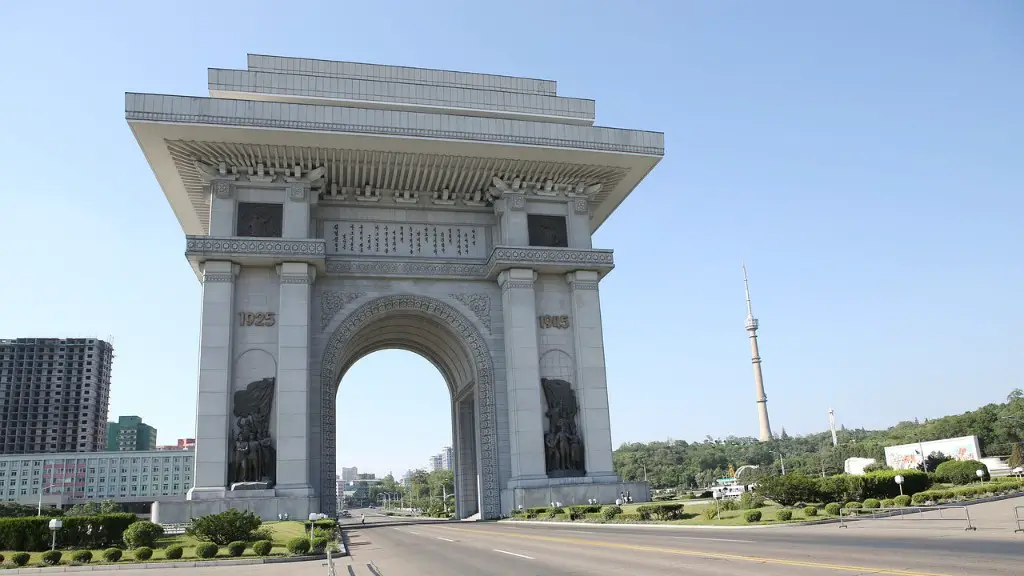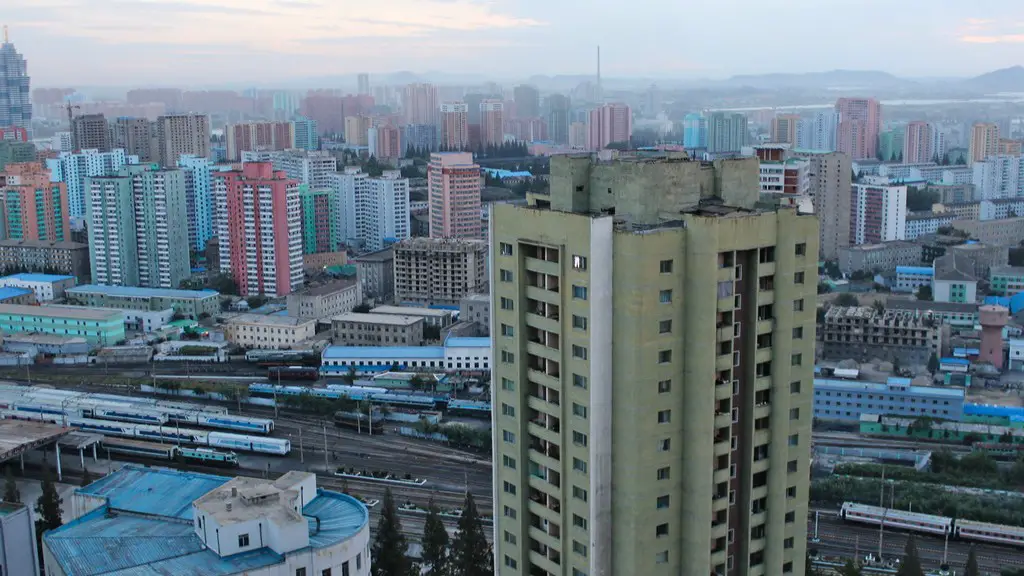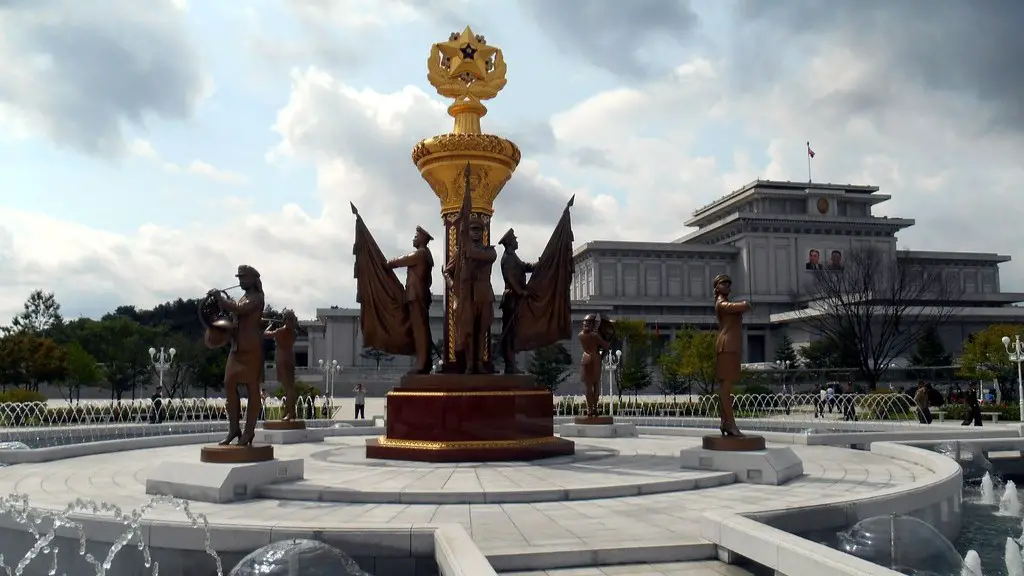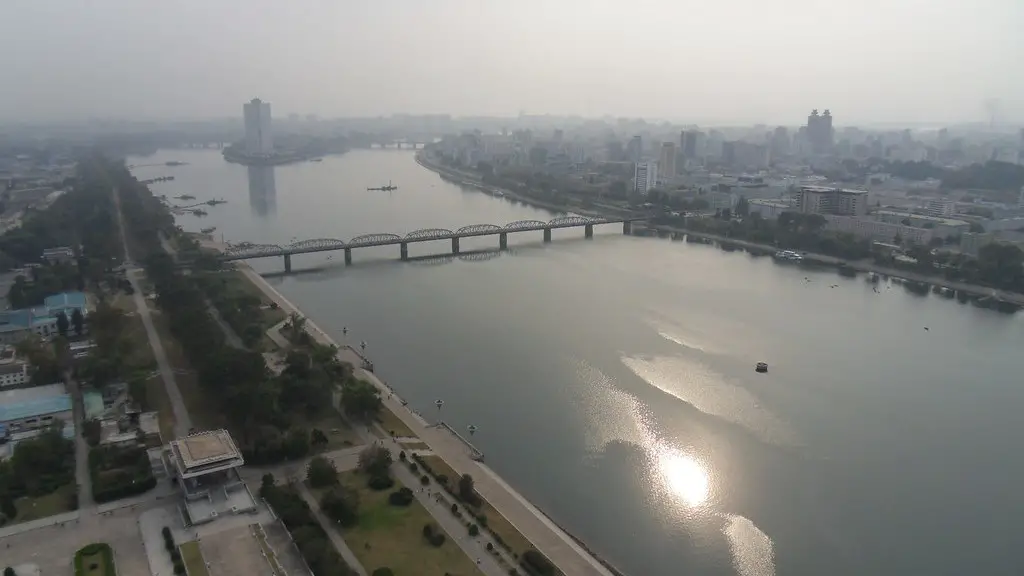In order to understand the division of the Korean peninsula from a modern perspective, it is important to understand its current status. At present, North and South Korea are two countries that are linguistically, culturally and ideologically separate. In fact, their division predates the Korean War, which began in 1950 and effectively established this condition. Before the division, the peninsula was largely similar, with two main languages and many shared customs and traditions. The country was then divided primarily along Cold War-era ideological lines, with South Korea becoming a democracy aligned with the United States and North Korea becoming a socialist “worker’s paradise” under the influence of the Soviet Union and China.
However, the division was actually part of a much longer process of division and political unrest in the region. Prior to World War II, Korea was a unified colony of Japan, essentially meaning that Japan controlled the entire peninsula. The Allied powers officially recognized this fact in a 1905 Treaty, although the region had been fought over for centuries before. Following the end of World War II, the Soviet Union and the United States declared that Korea should be divided, with each country occupying the northern and southern halves of the peninsula, respectively. This division was supposed to be temporary, but quickly became permanent.
The division of the Korean peninsula soon led to the outbreak of the conflict known as the Korean War, which pitted communism against democracy and ultimately resulted in the death of millions of Koreans and other combatants. This conflict continued until 1953 and resulted in the creation of two separate countries, with North and South Korea taking very different paths. The North embraced communism, while the South embraced democracy and capitalism. The two countries diverged further over the decades, and the North became increasingly isolated and hostile to the outside world, while the South developed into an economic powerhouse and a close ally of the United States.
The division of Korea also had an effect on the population of the peninsula. Many people were separated from family members due to the division, and some of these people were able to reunite after the Korean War had ended. However, the majority of Koreans were never able to reconnect with relatives and friends who were left in the North, and many of them are still searching for them today.
In addition to the devastating effects of separation on the Korean people, the division of the peninsula also had far-reaching effects on the geopolitical landscape of the region. North Korea has become a rogue state, and its nuclear weapons program has caused great concern in neighboring countries, especially in South Korea. Additionally, the North’s aggressive behavior has caused tensions to rise between it and the United States, and in recent years there has been a growing threat of conflict.
Ultimately, the division of the Korean Peninsula was caused by a combination of historical, ideological, and geopolitical factors. The effects of the division have been profound and long-lasting, and the issues of reunification and peace on the peninsula remain unresolved.
Geopolitical Relations
The geopolitical landscape of Northeast Asia has been largely shaped by the division of the Korean Peninsula. As mentioned above, North Korea has become a rogue state and a major source of instability in the region, due to its nuclear weapons program and other threats it has posed to its neighbors, especially South Korea. As a result, South Korea and the United States have had to develop a close relationship and cooperate to ensure the security of the region. Additionally, North Korea’s threats have created a situation of tension between neighboring countries, leading to a certain level of distrust and mistrust between them.
The United States has long been a major player in the region, providing economic and military aid to South Korea and other countries in the region. This has led to a strong relationship between South Korea and the United States, as well as growing tensions between North Korea and the United States. Additionally, countries such as China, Japan and Russia have all get involved in the region, primarily in an attempt to create a stable balance of power. This has resulted in a complex geopolitical environment in Northeast Asia, with many countries vying for power.
In recent years, however, there have also been efforts to improve relations between the two Koreas. In 2018, both countries met for diplomatic talks and agreed to work towards a peaceful resolution of the Korean conflict. However, this has yet to be implemented, and it remains to be seen if the two countries will be able to find a way to peacefully coexist.
Economic Impact
The division of the Korean Peninsula has also had a profound effect on the economies of the two countries. North Korea remains one of the most impoverished countries in the world, while South Korea is one of the most prosperous and advanced. The economic gap between the two countries highlights the consequences of the division, and there is also a stark contrast between the model of economic development. North Korea pursues an authoritarian model of economic development, which relies heavily on government control, while South Korea pursues a free-market model that encourages competition and innovation.
The economic disparity between the two countries has also caused problems for those living in North Korea. For example, poverty is widespread in the country and the lack of economic opportunity has caused many people to flee the country in search of a better life. Additionally, the economic sanctions imposed on North Korea by the international community have only worsened the situation, making it almost impossible for the country to develop economically.
For South Korea, the divide has had a positive economic impact. The country has thrived since the Korean War, thanks to its economic liberalization efforts and strong ties with the United States. This has allowed South Korea to become one of the most successful economies in the world, with per capita income levels that are by far the highest in the peninsula. Additionally, the South has been able to attract large amounts of foreign investment, which has further strengthened its economy.
Political Implications
The political implications of the division of the Korean Peninsula are evident in the current state of affairs in the region. North Korea remains a one-party state and is firmly in the control of the Kim family, while South Korea is a vibrant democracy with a number of different political parties. This divide is also evident in the national identities of the two countries. North Korea sees itself as a self-reliant, socialist nation, while South Korea has embraced democracy and capitalism and seen itself as an important ally of the United States.
The political divide between the two countries has also manifested itself in other ways. For example, North Korea has taken an increasingly hostile stance towards the United States and its allies, while South Korea has emerged as one of the United States’ closest allies in the region. Additionally, the South has made efforts to improve relations with North Korea, primarily through diplomatic talks. However, these efforts have been largely unsuccessful, and the two sides remain deeply divided politically.
Additionally, the South has sought to engage with North Korea economically, in order to provide it with much-needed aid. In recent years, South Korea has provided large amounts of aid to North Korea and has supported efforts to increase economic and political ties between the two countries. However, these efforts have so far been unsuccessful, and the two sides remain divided politically and economically.
The Future of the Korean Divide
The future of the Korean Peninsula is uncertain, and the issue of reunification and peace on the peninsula remains unresolved. In recent years, there have been efforts to improve relations between the two countries, but these have so far been largely unsuccessful. Additionally, tensions between North Korea and the United States have continued to be high, leading to fears of a potential conflict in the region.
However, there is still hope for peace in the region. South Korea and the United States have continued to work towards a peaceful resolution, and there is the possibility that the two sides can find a way to peacefully coexist. Additionally, South Korea has continued to engage with North Korea economically, in an attempt to improve its economic situation and provide humanitarian aid.
Ultimately, the future of the Korean Peninsula will depend on the willingness of both sides to come to a peaceful resolution. For now, the situation remains uncertain, but there is hope that the two countries can eventually find a way to peacefully coexist and reunify.
Cultural Impact
The division of the Korean Peninsula has had a profound effect on the culture of both countries. Prior to the division, there were two main languages and many shared customs and traditions throughout the peninsula. However, these have been eroded in some areas due to the division, and there are now distinct cultural differences between North and South Korea.
For example, North Korea has adopted its own version of the Korean language, which has evolved to include socialist terms and expressions that are not found in the South’s version of the language. Additionally, North Korea has adopted its own unique style of dress and aesthetic that is distinctively different from the South. North Korea has also developed its own unique system of government and social structures, which has further eroded cultural similarities between the two countries.
On the other hand, South Korea has embraced global trends and has adopted aspects of other cultures. The South has also adopted a much more liberal approach to culture, with greater freedom of expression and less restrictions on the media. Additionally, South Korea has become an important player in the global cultural landscape, with the country’s popular music and television shows being exported to other countries.
Overall, the division of the Korean Peninsula has had a major impact on the cultures and identities of both countries, and the two sides now have very distinct differences in terms of language, culture, and political and social structures.
Reunification
The ultimate goal for the Korean Peninsula is reunification. However, it is unclear if and when this will happen, as the two sides have been unable to come to a consensus on the issue. Both North and South Korea have stated their commitment to reunification and have expressed their desire for peace on the peninsula, but the disagreement over the political structure of a unified Korea has been a major obstacle to progress.
In recent years, there have been efforts to improve relations between the two countries, particularly through economic engagement. South Korea has provided large amounts of aid to North Korea, and both sides have expressed their commitment to peaceful reunification. Additionally, North and South Korea have held numerous diplomatic talks with the aim of improving relations and reaching a peaceful resolution to the issues on the peninsula.
Despite these efforts, the division of the Korean Peninsula remains unresolved and the issue of reunification remains uncertain. Moreover, the political, economic, and cultural differences between the two countries make it difficult to imagine a simple and peaceful reunification. Nonetheless, both sides remain committed to a peaceful resolution and there is still hope for a reunited Korean Peninsula.





